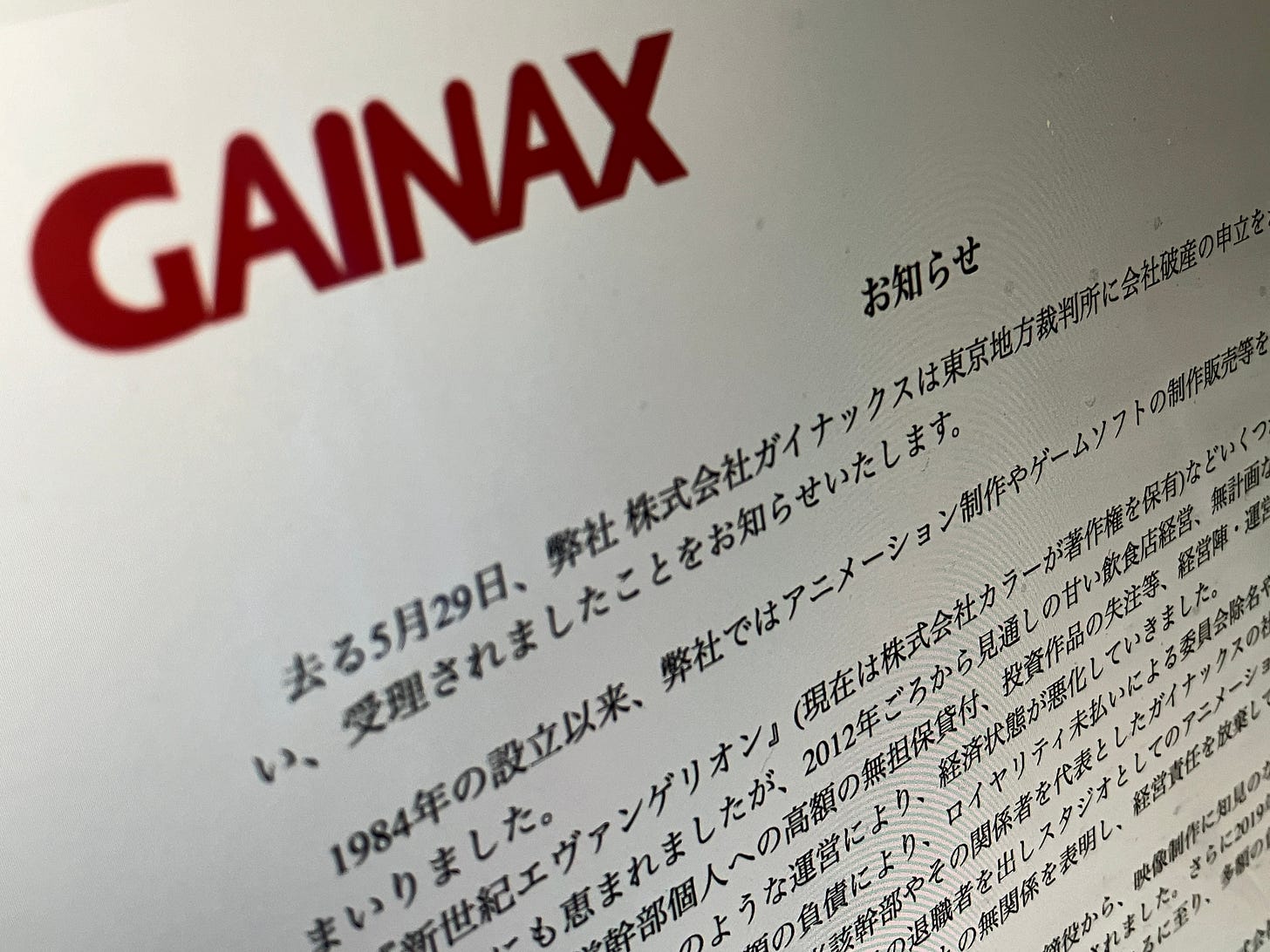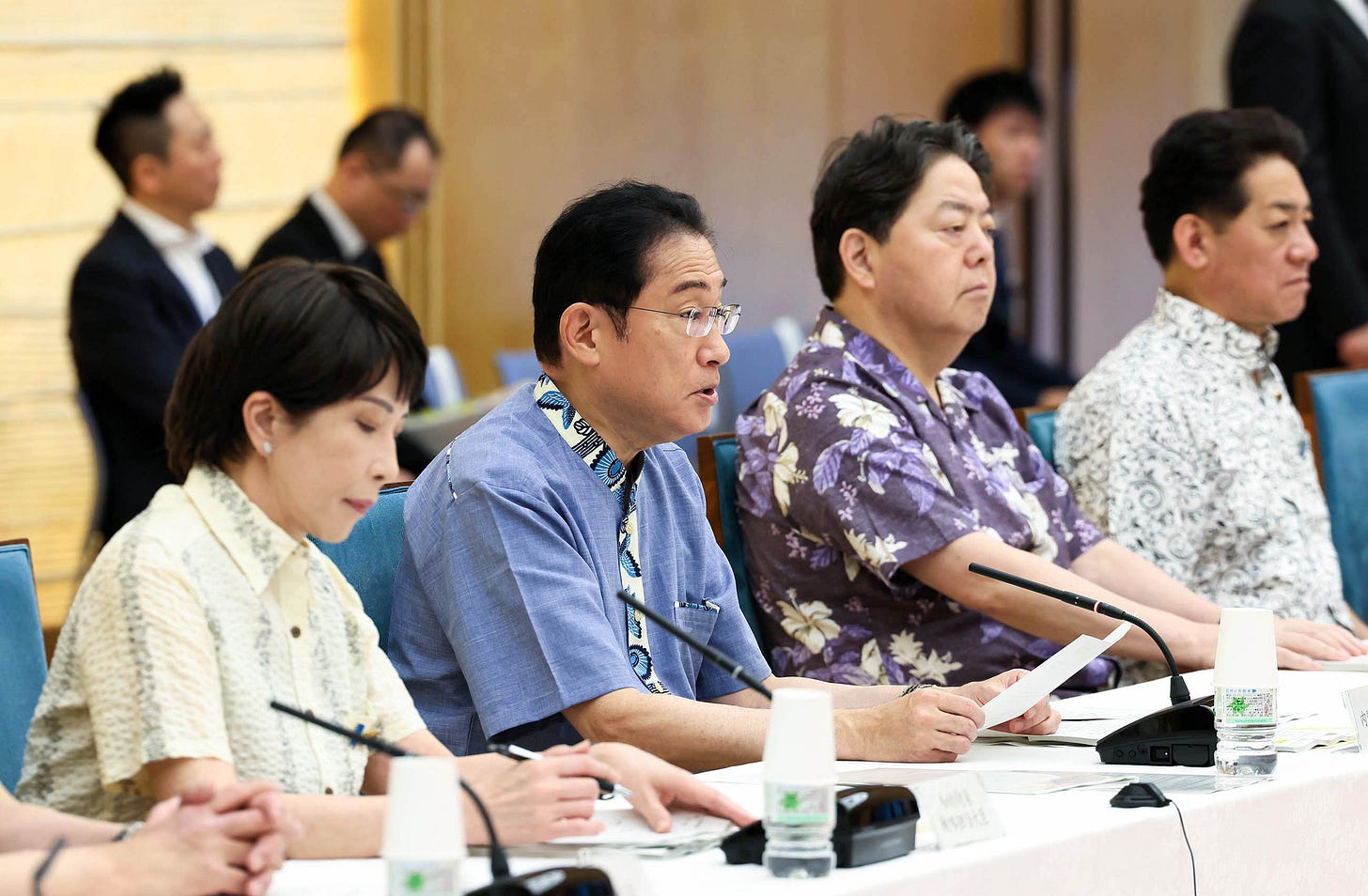Anime studio Gainax enters bankruptcy
Plus: Japan to boost anime and manga exports; Translators denounce AI manga translations; Voice actor magazine ends 20-year print run; and more
This is your weekly Animenomics briefing, covering the business of anime and manga. Today is Wednesday, June 12, 2024.
In case you missed it: Acclaimed director Hideaki Anno left open the possibility of future works in the Evangelion anime franchise in an interview with The Asahi Shimbun.
Facing insolvency, Gainax begins bankruptcy process

Gainax, the anime studio credited with producing Neon Genesis Evangelion, Nadia: The Secret of Blue Water, and others, received approval from Tokyo District Court last Wednesday to enter into bankruptcy proceedings.
Why it matters: Despite becoming a household name in the 1990s, Gainax later fell victim to corporate mismanagement and an inability to diversify its business.
A statement by Gainax president Yasuhiro Kamimura reveals that previous leadership had incurred a large amount of debt beginning in 2012.
For years, executives cannibalized the company by establishing spin-off entities bearing the Gainax name in Japan’s outer regions, and all eventually disavowed any affiliation with the original Gainax.
By the numbers: Credit research firm Tokyo Shoko Research estimates Gainax owes approximately ¥380 million (US$2.4 million) to 71 creditors.
In May, a debt collection agency filed a debt claim lawsuit, leading the current leadership that took over in 2020 to determine that the company is no longer solvent.
What’s next: Khara, the studio founded by Evangelion director Hideaki Anno that has attempted to rescue Gainax’s operations in the past, will assume management of Gainax’s trademark and intellectual property rights.
“It is regrettable for an animation studio with a nearly 40-year history to come to an end in this way,” a statement posted to Khara’s website reads.
Khara plans to work with anime production committees that Gainax has been involved in to determine the appropriate party that will assume copyright management of each anime.
This announcement confirms previous reporting by Animenomics that anime production studio Trigger had assumed the copyright of Panty & Stocking with Garterbelt from Gainax.
The bigger picture: Data compiled by credit research firm Teikoku Databank shows that corporate bankruptcies in Japan rose to a 12-year high last month.
Kishida gov’t boosts support for anime, manga exports

Japan wants to grow the overseas market size of anime, video games, and other creative industries to ¥20 trillion (US$127 billion) in the next decade, over four times today’s level, Prime Minister Fumio Kishida’s government said last week.
Why it matters: The creative sector is the anchor of the government’s New Cool Japan Strategy, which aims to bring in more than ¥50 trillion (US$318 billion) per year by 2033, The Mainichi newspaper reports.
Rewind: Japan initially tried to launch its Cool Japan Strategy in 2019, but the COVID-19 pandemic forced the government to pivot from many of those plans.
Zoom in: An overview of the new strategy points to a desire to make it easier for entertainment companies to expand overseas and to recruit human resources, in addition to strengthening anti-piracy efforts.
The full strategy document calls for increased support to small and medium anime studios in training young animators and producers.
The report also contends that while digital manga is popular in Japan, print manga remains popular overseas, and the delay in localized publication is the primary cause of rampant piracy.
During questioning in a budget committee meeting of Japan’s upper legislative body on Tuesday, Kishida said the Japan Fair Trade Commission’s investigation of unfair contracts in entertainment will expand to the film and anime industry starting next year.
Of note: The report further calls for strengthening the bargaining power of anime studios, especially when negotiating with international streaming platforms.
Yes, but: More transparency is needed not only in international contracts, but also in domestic contracts between production committees and anime studios.
Clippings: Translators balk at AI translation of manga

Mass translation of manga using artificial intelligence technology diminishes the value of translation work, says the Japan Association of Translators, a non-profit organization with more than 700 members. (Press release)
Catch up quick: Shogakukan and other investors recently poured ¥2.92 billion (US$18.6 million) into Tokyo-based startup Orange to translate 50,000 manga volumes into English using AI technologies.
Naver Webtoon’s LINE Manga app has overtaken Kakao Piccoma in Japan as the number one manga and webtoon mobile app in consumer spending for the month of May, according mobile data analytics firm Data.ai. (Yonhap News Agency)
Producers of Dahlia in Bloom, an anime series airing this July, have ordered some scenes to be reanimated after concluding that a Chinese sub-subcontractor likely outsourced part of its work to a North Korean animation studio. (ITmedia News)
Doraemon the Movie: Nobita’s Earth Symphony has become the highest-earning anime film in Vietnam’s box office history, earning ₫1XX billion (US$) since its release last month. (Box Office Vietnam, via Poste)
Manga giant Shueisha jumps into webtoon business
“I think that the advent of vertical manga will increase the total number of people who want to write stories. When novelists, scenario writers, and other people who want to create stories with words also want to produce the pictures, I think it will be easier for them to create their own storyboards with vertical manga than with horizontal manga.”
— Takanori Asada, Jump Toon executive editor at Shueisha
Context: In an interview with Minto director Genta Nakagawa for CNET Japan, Asada and his deputy, Jump Toon editor-in-chief Hiroyasu Miwa, explain why the manga publishing heavyweight Shueisha launched its own webtoon platform last month.
Along with the Jump Toon publishing platform, Shueisha also launched Jump Toon Next! as a user-generated content platform for new creators looking to break into the manga industry.
What they’re saying: “To use the analogy of forestry that Asada often uses, I think it would be good if we planted many trees and some of them could make a profit,” Miwa elaborates on Jump Toon’s goals. “Not all trees will be profitable, but even small trees now may grow into large, strong trees in the future, so we will invest in their growth.”
What we’re watching: As part of the launch, Shueisha is also recruiting creative staff for a webtoon production studio to support the aspiring writers mentioned by Asada.
“We are not against studio production, and we think that studio production has its strengths—the fun of collective intelligence,” Miwa explains.
Seiyu Animedia ends 20-year run covering voice actors

This week’s publication of the final issue of Seiyu Animedia, a magazine featuring interviews with anime voice actors, marks the end of a 20-year print run for one of the most popular periodicals about voice actors.
Why it matters: Seiyu Animedia’s closure follows the current trend of Japanese print magazines losing readership to digital publications.
By the numbers: Seiyu Animedia had a circulation of 13,400 copies in 2019, the last year data is available from the Japan Magazine Publishers Association, down from a peak of nearly 21,000 copies in 2009.
Rival magazine Seiyu Grand Prix has a circulation of 17,600 copies today, down from a peak of more than 30,000, also in 2009.
Between the lines: Despite falling circulation of voice actor magazines, interest in voice actors have never been higher, Riuichi Taniguchi writes in Real Sound.
IID, which publishes Seiyu Animedia, still has other mediums to publish stories about voice actors, such as the parent Animedia anime magazine and the Anime! Anime! information website.
Animenomics is an independently-run and reader-supported publication. If you enjoyed this newsletter, consider sharing it with others.



AI as it is lacks the comprehension skills needed to grasp linguistic nuances and context, so I side with translation association regarding this issue.
Also, I wonder if the Japan Fair Trade Commission's investigation will be a catalyst for eventually addressing the low wages in the anime industry.